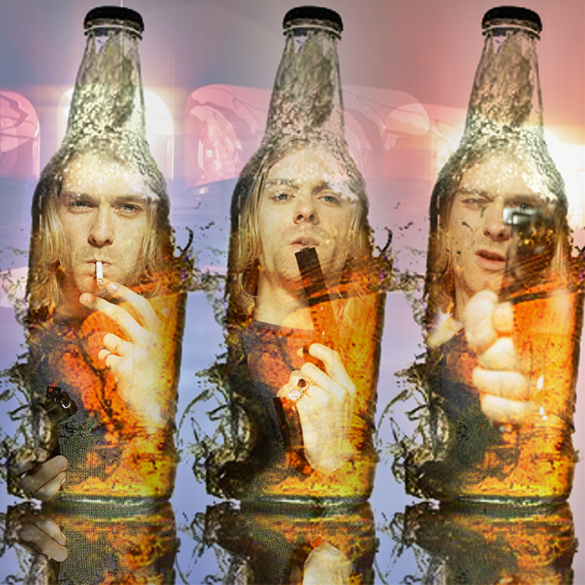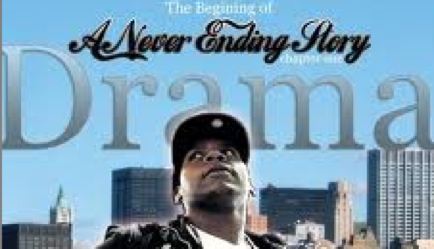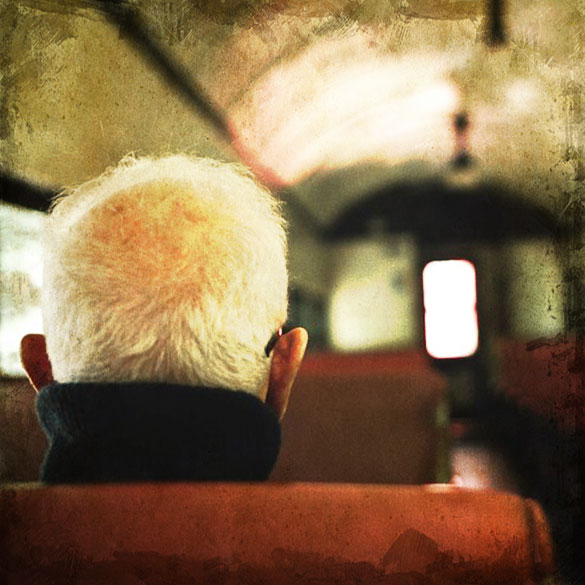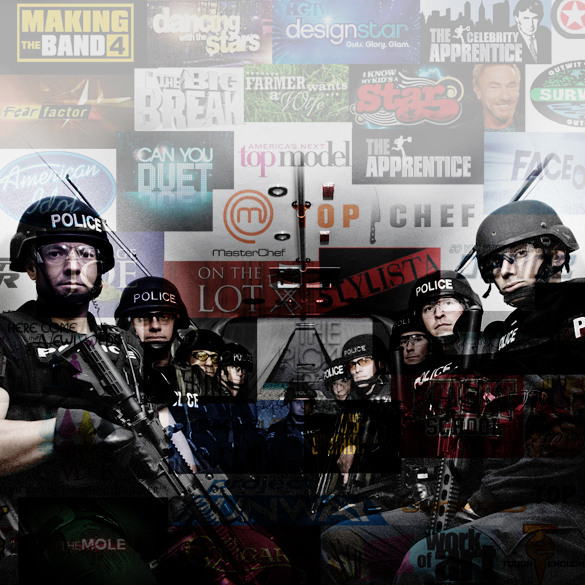The band was practicing here for the first time, three of us in my living room, when grunge was all the rage. We called ourselves Count Bitchula. People likened our sound to a brutally overdriven version of Violent Femmes. They associated us with the Melvins, Nirvana. I didn’t mind the comparisons. I would’ve personally thanked Kurt Cobain for ending the reign of hair metal if I could have. Incidentally, Kurt Cobain and I were both twenty-seven that year, and I felt an odd kinship with him every time I put on a Nirvana record. This was somebody who never bought into the lies, somebody who’d figured things out, who knew that idiots ruled our planet and he was having no part of it.
The three of us shook the little house I was renting, a single bedroom off Pecan Street, with our own rendition of Kiss’s “Almost Human” and a number I wrote called, “A Fistful of Mildred’s Dollars.” Our bassman could really drive the groove and looked like he’d done time in prison. He’d shaved his head and wore a nose ring like a bull, a Dracula tattoo on his shoulder, and he dressed in dark t-shirts and black denim. He was also the singer. He sang like Cookie Monster. He also used a bullhorn on a couple of tunes for effect. We called him Fester Hopwood.
The drummer was a high school horticulture teacher who could’ve been Alice Cooper’s Amish cousin, wearing a Mack truck ballcap. His drumming was frantic, and the shells of his four piece kit were coated in a jazzy, pearly finish and the cymbals sounded like trash can lids.
As for me, I lacked basic furniture and a television but held an impressive collection of albums, a fine stereo, a tube amp, and an arctic white Fender Telecaster that was worth more than my car.
We ran through maybe four numbers and then, right in the middle of a song, I noticed this cop standing in the middle of my living room. The cop was rawboned and convincingly hillbillyish with a holstered gun and a Jimmy Carter smile. He seemed to be enjoying himself. The musical pulse in the room weakened, wilted, came to a complete stop in his presence.
“It’s a bit too loud,” the cop said. He hollered in a tinny voice like he was talking to old people. He might’ve been new to the cop business because he said too much, narrowed things down for us. Some lady up the road had called the police station, he said, complaining about the noise, saying she just couldn’t take it anymore.
When the cop left, our drummer packed up and went home to his wife. Fester and I didn’t know what to do with ourselves. The cop had suggested a lower volume. He didn’t know much. We were a rock band. We uttered profanities and drank. Fester had stashed some Rolling Rock in the fridge. He put away beers like it was nothing, guzzling three in the time it took me to drink one.
Fester had been staying with me lately. Every morning he left for a five-mile run and returned with a six-pack and a bag of Washington apples. He sanded furniture in a shop for several hours a day, and in the late afternoons he played tennis in his blue jeans with an English professor. He drank beer like the world was ending, but he looked like a champion boxer.
Neither of us had done too well with marriage. My wife left me over a guitar. Our Chrysler needed new tires, but someone offered me a deal on an American-made Telecaster, which made me feel very American, and Mildred concluded she’d married a child.
Now that Count Bitchula’s jam session was irrecoverable, Fester and I discussed how much we hated this town.
“Full of worthless pricks,” was how he put it. Fester looked like somebody you’d hire to deal with difficult people.
“We need people like you in positions of authority,” I said to him. “People who scare people.”
We decided the town motto should be, “Turn that shit down.”
The more I thought about that cop showing up, the more resentful I became. I demanded to know who called the police. A cluster of houses was a half-mile away, and between us was a timbered area, hemmed in by the main road, and a medium-sized Methodist church.
“What we ought to do,” I said, “is go scare the shit out of that lady, really do a number. Teach her what happens when you bitch about our music.”
I didn’t know who the lady was or where she lived. I knew nothing about people on this street. Our plan was to search for a house with a polished yard, like something out of a magazine, reasoning that anyone who would be that uptight about their yard would be pretty self-absorbed. But I had no idea what we’d do when we found it. I hadn’t thought things through.
We grabbed another beer and cut through the woods, which made more sense than driving since stealth was a factor here and my Chrysler needed a new muffler. Dusk was quickening into night as we set out. Thinking back on it now, we probably weren’t in the best frame of mind, walking around at night, toting beer bottles, angry. I feel it’s important to mention, though, that Fester bringing his bullhorn along on this walk was not my idea.
I remember the time because seven days ago had been Good Friday. The part of Christianity that makes sense to me is the crucifixion. Virgin births and resurrections are one thing, but I’ve never had trouble believing that someone like Jesus wouldn’t last long on this planet. This world enjoys silencing people like Jesus and sending cops to your house to tell you the music’s too loud.
Fester and I searched for a yard with pomposity written all over it. The problem though, was that every yard looked pompous—stone walkways, gazebos, junipers, mulch smells, azaleas, and expertly groomed Kentucky bluegrass lawns, chemically enhanced, and American flags flapping in the night breeze. The flags were interesting because Fester had been in the army, some covert operation in Central America back in Reagan’s time. Not a real war, he said. You couldn’t buy a Time-Life collection on it.
Fester mentioned us going to the Red Devil Inn for a hamburger. His interest in retribution was waning, I could tell. That’s when the Methodist church came into view. Two streetlamps provided scarce light. The church building looked like a fine motel, all the brick. There’d been the usual Easter hubbub around here last weekend. Now, the church was tomblike. On the dark side of the building, bordering more woods, the church bus was parked, the color of a robin’s egg, at the edge of the lot beneath a sovereign, corrugated metal awning, as if the bus were in its own temple. A passing car would never see the bus from the road.
Our beers were still cold. We’d yet to open them, so we sat at some picnic tables beneath an unlit tin roof pavilion in view of the bus and drank them, expecting that someone would appear and run us off.
We got into talking about our parents. How this happened is that Fester had read a magazine article about how pathetic our generation was—how jaundiced we were, how we lacked direction, how we’d never accomplish anything because we were too busy being alienated.
“Who wrote the article?” I said.
“Somebody our parents’ age,” he said.
My dad was an auto-mechanic, I told him. My dad used to speak on how on the rising price of gas brought this country great ruin because the day that gas hit a dollar a gallon people started driving cars from Japan that were rather plain-looking, and in no time American cars started looking pretty damn ugly, all in the name of fuel efficiency, a phrase that we—meaning me and my deplorable generation—heard on commercials. Among the cars my dad had at one stretch or another was a Pontiac Trans-Am like Burt Reynolds drove in Smokey and the Bandit, except that it was piss yellow, which is probably why he could afford it. One time, my parents argued about a Chevy Nova my father bought after he saw a movie with a Chevy Nova in it. My mom said we need something fuel-efficient, like a Toyota. They argued about money endlessly.
Fester’s story was a bit gloomier than mine.
“My old man used to put me in the car at night and go searching for my mom,” he said. “I’d be lying in the back seat, and he’d drive all over the place, looking for her car.”
“Even in the rain?” I asked.
“It’d be raining like a sonofabitch, and he’d go looking for her,” he said.
Right out of the army he went to college, and right out of college he married a redhead who was into David Bowie, except that she held no awareness of David Bowie. She’d never heard Ziggy Stardust or Diamond Dogs. Her sole knowledge of Bowie was Let’s Dance and the soundtrack to Labyrinth, which irritated Fester to no end, so he considered her an idiot. That was the least of his problems. He found his wife’s Corolla parked at a Howard Johnson’s. She was having a fling with a man who owned a lot of Johnny Mathis records.
Now, Fester and I noticed something at the same time, a stirring inside that church bus. There was blurring, familiar movement. On the other side of those windows, two nymphos went at it in the rear seat.
“Romantic as hell,” Fester said.
The scene caused me to become bitter about my wife, over the way she’d talked down to me and how she needed a break, calling me immature because I spent money on music equipment but didn’t have a career. I had a degree in the fine arts, which was supposedly good for the soul, but otherwise useless. That’s the way she put it. I wanted to be happy in my work, I told her. She said, “People don’t pay you to be happy.”
Fester and I were still in view of the bus and its current occupants when I said, “Let’s make them think the cops are here.”
Fester said we should loop the building, come out the other side, and we’d be right at the bus. Otherwise, we’d walk into the light and they’d see us coming.
What I had in mind was a mild prank. Fester would say something officious through the bullhorn, like, “This is the police.” Give them a scare. We’d hide, watch their clothes fly around. The couple would evacuate and haul ass. That’s what I thought would happen.
Fester, though, smiled like he was about to take over the world. We came around the corner, right upon the vehicle yet cloaked in blackness. He flipped the bullhorn switch and a deafening shrill penetrated the night.
“This is the police and we’ve got the place surrounded,” he said. “Put your hands on your head and exit the vehicle immediately.” He sounded like the real deal.
The culprits were frozen in their sexual commerce, immobilized in their raunchiness. The universe paused. I’d nearly dissolved into excruciating laughter, but Fester held a stern expression.
“Exit the vehicle at this moment.”
Now there was panicky movement inside the bus. Apparently the sinners were gathering clothes, intent on dressing themselves.
“Leave your clothes behind and get out of the damn bus,” Fester said. The reverberation of the megaphone somehow lent authority to the illusion that the bus was indeed surrounded by a throng of uniformed people.
The wrongdoers deliberated and plodded out as though wearing leg irons. The boy was a teenager, maybe a point guard on the school basketball team. His doo-hickey was still engorged, his hands held above his head like this was a stick-up. He was fossilized in his terror.
“Face down on the ground, John-boy,” Fester said. He and I remained in the shadows. Our faces were unseen.
There’s no way the poor kid could’ve known what was really happening. He noted his swollen member and followed orders best he could, his elbows down first, facing the cool, damp blacktop.
“We’re sorry sir,” the boy said.
“I didn’t ask you a gawddamn thing.”
The girl came out of the bus sobbing, her arms folded over her breasts. She was high cheekboned and full-lipped with an enormous tumbleweed of ruby hair. Her hair was an event.
“Oh gawd,” she kept saying, facing the ground in the manner of her cohort. She had the honeyed, rounded flesh of a Pre-Raphaelite. I couldn’t blame the guy for giving her the business.
“Fornication on a church bus is a serious offense.” Fester now moved out of the blackness and stood over them in his Doc Martens like a tyrant, their backs to him. I stayed put, clinging to the corner of the brick building, hidden.
“Does this seem funny to you?” Fester said.
“No sir.”
“What I ought to do is scar you like Cain.” Fester was a hutch of beastliness with a rising distaste for humanity in his voice. He ogled at the girl like he both needed and reviled her.
Naked and ashamed, the couple stared at the blacktop, some nihilistic Adam and Eve sculpture. They woke up that morning with no idea as to what was coming. Down to the essence of my bones, I was nearly paralytic with interest in how easy it was to degrade a person, change how they saw the world, put an imprint on how they dealt with things. I’d witnessed something disturbing here.
Fester backed out of there, crept away from the bus, back toward where I stood. The couple, still facing the blacktop, probably figured he was there, but we left them to resolve things on their own.
“Let’s get the hell out of here,” Fester said. We circled back and cut into the woods and sprinted until we found the main road where he bent over in laughter, reverting into the congenial Fester that everyone loved. He retold the event, as though I’d missed it, all the way to the Red Devil Inn, which was a mile away. We walked the edge of the road and every time a car passed, I thought it was those nymphos.
#
The Red Devil Inn was dank, very dark. It had bars on the windows. At least once a week, there’d be a fight. There wasn’t much happening tonight, though, other than a few people watching a basketball game on a Zenith with the volume way down, and Jim Morrison singing about strange people from the jukebox. I ordered a Rolling Rock, and Fester, the affable sort, chatted with the bartender.
Fester came back a few minutes later and told me that Kurt Cobain had committed suicide. An electrician in Seattle found his body that morning. Kurt shot himself.
At first I figured somebody was lying. Then I knew they weren’t, because this kind of shit was always happening to me. It was like a brother I’d never met had died. It’s immoral that things like this happen.
What I might’ve said to Kurt. I imagined him coming to my house, wearing his gray, thrift-store cardigan and go-to-hell blue jeans. He wouldn’t care that I didn’t have furniture. He was never superficial. He’d squat on the floor, against the wall. I’d offer an apple.
“I can’t stand things anymore,” Kurt would’ve told me.
“This is a shitty time in history to be twenty-seven years old,” I would’ve said.
“You’re the only one who understands me,” he’d say.
I could’ve talked him out of it.
Fester was already on his third beer. This is why people drink, I knew.
I felt as though something had really ended and I didn’t know what to call it, how to mark it—as though the planet was truly getting worse, dumber, meaner; as if my future had been derailed, whatever future I had. People would now start using idiotic phrases like, “post-grunge.”
In that moment, I knew that interesting music had ceased to exist.
END
—
Matthew McEver holds the MFA in Creative Writing from Converse College in Spartanburg, South Carolina, and his fiction was nominated for the 2014 AWP Intro Award. He currently lives in northeast Georgia.



